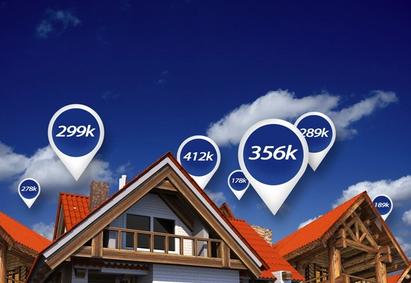How Much Mortgage Can I Actually Afford?
Written by:
Patrick Boyaggi
Patrick Boyaggi
CEO an Co-Founder
Patrick is the Co-Founder and CEO of Own Up. He has a wealth of experience and knowledge as a mortgage executive.
See full bio
Fact Checked by:
Mike Tassone
Mike is a Co-Founder and Chief Operating Officer of Own Up. He has expertise in all areas of residential lending, having led operations for a top 40 lender in the United States.
See full bio

Are you planning to buy a house? Before you even start looking, you should have the best sense possible of what you can actually afford.
Knowing what size mortgage you can afford will help guide your search and can even give you a leg up when making an offer. Your monthly budget, current savings, credit score, and the terms of the loan are all factors that contribute to what you can afford.
Calculate Your Monthly Budget
Before deciding how much mortgage you can afford, it’s important to take stock of your current monthly budget.
Take your total amount of monthly income from all sources and subtract any recurring monthly expenses like rent, utilities, and student loan payments. This will give you a general idea of the room in your budget available for a monthly mortgage payment, homeowners insurance, and other housing expenses.
Take Note of Your Current Savings and Debt
The larger the down payment you can afford, the better rates a mortgage lender will offer. While you may have heard that a 20% down payment is standard, that isn't necessarily the case.
The 2022 National Association of Realtors Report found the average down payment for first-time home buyers was 6%, while the average down payment for a repeat buyer was 17%.
You can do some relatively straightforward math to determine how much you'd need to have saved up to cover different down payments and get a better sense of the maximum mortgage you can afford.
Factor in Closing Costs
While your down payment and monthly mortgage payments will make up the bulk of your loan cost, you should also consider closing costs when determining how much mortgage you can afford.
Closing costs can differ depending on the type of mortgage. There could be origination fees, inspection fees, realtor fees, and more. Closing costs typically add up to 1-2% of the home purchase price. Consider researching different mortgage companies to better estimate your home buying budget.
Consider Your Credit Score
While there may not be an official minimum credit score required for a mortgage loan, a bad credit score will make it harder to be approved and can result in worse mortgage terms.
One of the most effective ways to raise your credit score is by using credit cards responsibly. That means paying off your existing credit card debt and paying down the balance in full each month.
You'll be able to access a better mortgage rate if you take time to improve your credit score before you apply, but if you can't wait then be sure to factor the increased cost into your estimates.
Know Your DTI Ratio
If you're approved for a mortgage, your total monthly debt obligations going forward will include your mortgage payment, property tax, and insurance payments in addition to your current debts. That can add up to significant extra payments.
Lenders care about how much money you make relative to your current monthly debt payments because they need to be sure you have the capacity to make your mortgage payment month to month. This measurement is your Debt-to-Income ratio (DTI), which is calculated as follows:
Total monthly debt obligations/Gross monthly income
Lenders will receive an accurate account of your monthly obligations by requesting a credit report from the credit bureaus.
A DTI at or below 43% is typically accepted by many lenders. Calculating this ratio can become more complex if you don't have one steady income or your income varies due to seasonality or commission.
If your DTI is more than 43%, you should consider avoiding additional debt and paying down your current debts to lower your monthly bills before starting the application process. Even if you are approved with a higher DTI, you'll likely be looking at a higher housing payment.
Research Mortgage Interest Rates
One of the first steps in the homebuying process should be researching current market rates. This will help you determine the size of the mortgage you can afford and help find the best possible option when seeking a loan. Online resources make it easy to compare different loan types and lenders so that you can accurately estimate what the total cost of different types of mortgages would be.
Determine an Estimated Monthly Payment
Once you have a sense of your estimated home buying budget and current mortgage rates, you can use an online mortgage calculator to estimate your monthly housing costs for different loan terms. The best online calculators, like the Own Up Rate Range Finder, allow you to input an array of factors like maximum loan amounts, down payment amounts, different credit scores, and more to get a sense of what your monthly payments and total cost would be.
You can also try inputting a 15-year mortgage or a 30-year mortgage to see how the different terms affect your payment requirements month to month and in total.
The 28/36 Rule
At this point, you should have a better sense of what size mortgages might be in your price range. Assuming you don't have a specific home with an existing purchase price in mind, how much of your income should you be willing to spend on mortgage payments?
Obviously this will ultimately come down to your individual financial situation but one common rule of thumb is known as the 28/36 rule.
According to the rule, your mortgage payment shouldn't be more than 28% of your income and your combined financial obligations should be no more than 36% of your annual income.
Regardless of how closely you stick to the rule, you shouldn't simply purchase the most expensive house you can theoretically afford. If you're spending all of your income on housing, there won't be anything left to cover unexpected expenses in the case of a financial emergency.
Other Mortgage Types
Before you officially begin house hunting, you should see if there's a better option for you than a conventional loan.
Many first-time buyers use loans backed by the Federal Housing Administration, or FHA loans. While these loans allow for a smaller down payment and are more accommodating of bad credit, they're also more restrictive than conventional mortgages.
Specifically, there is a maximum loan amount that can be borrowed and long-term insurance requirements. FHA loans can also only be used for a primary residence.
VA loans, meanwhile, are backed by the Veteran Administration and don't require private mortgage insurance. However, they're only accessible to active-duty troops, veterans, and surviving spouses.
Pre-Approval and Beyond
You've determined around how much you can borrow and what you can pay each month to do so. You've done your research and have a sense of what type of loan is best for your credit rating and what the current real estate market looks like. Is it time to look up listings and find an agent?
Pretty much! But you should also consider grabbing a mortgage application and submitting your financial information to a mortgage broker to receive a preapproval letter. That can give you the edge if you find yourself in competition with another potential buyer.
Hopefully you'll now know around how large a mortgage you can afford. It's only the first step of your home-buying journey, but it's one you want to get right.


